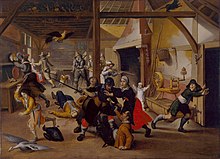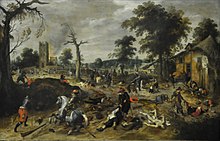Sebastiaen Vrancx: Difference between revisions
authority control moved to wikidata |
deleted: "Though occasionally vigorous in drawing, his paintings are dull and heavy in tone." because it is subjective. |
||
| Line 21: | Line 21: | ||
He was esteemed as one of the main painters of battle scenes, and works by Vranckx were in the collection of Peter Paul Rubens.<ref>Muller, Jeffrey M., ''Rubens: The Artist as a Collector'', Princeton, 1989, ISBN 0-691-00298-3.</ref> As a collaborator he worked at times with [[Jan Brueghel the Elder]].<ref>[http://www.abcgallery.com/B/bruegel/jan19.html "Assault on a Convay", combined work of Jan Brueghel the Elder and Sebastiaan Vranckx],</ref> and together with Rubens, [[Francken|Frans Francken the Younger]], [[Hendrik van Balen|van Balen]], [[Frans Snyders]] and [[Joos de Momper|Joos de Momper the Younger]] on the ''Allegory of the Senses'', two works commissioned on the occasion of the archduke [[Albert VII, Archduke of Austria|Albert of Austria]]'s visit to Antwerp. His best-known student is [[Pieter Snayers]]. |
He was esteemed as one of the main painters of battle scenes, and works by Vranckx were in the collection of Peter Paul Rubens.<ref>Muller, Jeffrey M., ''Rubens: The Artist as a Collector'', Princeton, 1989, ISBN 0-691-00298-3.</ref> As a collaborator he worked at times with [[Jan Brueghel the Elder]].<ref>[http://www.abcgallery.com/B/bruegel/jan19.html "Assault on a Convay", combined work of Jan Brueghel the Elder and Sebastiaan Vranckx],</ref> and together with Rubens, [[Francken|Frans Francken the Younger]], [[Hendrik van Balen|van Balen]], [[Frans Snyders]] and [[Joos de Momper|Joos de Momper the Younger]] on the ''Allegory of the Senses'', two works commissioned on the occasion of the archduke [[Albert VII, Archduke of Austria|Albert of Austria]]'s visit to Antwerp. His best-known student is [[Pieter Snayers]]. |
||
Most of his pictures represent biblical scenes or scenes of war, such as the sack of towns, cavalry combats, [[genre works|genre paintings]] and [[Allegory|allegorical]] subjects. |
Most of his pictures represent biblical scenes or scenes of war, such as the sack of towns, cavalry combats, [[genre works|genre paintings]] and [[Allegory|allegorical]] subjects. |
||
He was at the same time a writer of poetry, comedies and tragicomedies for the [[chamber of rhetoric]] ''De Violieren''. He was served as dean of the Antwerp painters' [[Guild of St. Luke]], and was a district head and captain of the militia. |
He was at the same time a writer of poetry, comedies and tragicomedies for the [[chamber of rhetoric]] ''De Violieren''. He was served as dean of the Antwerp painters' [[Guild of St. Luke]], and was a district head and captain of the militia. |
||
Revision as of 15:45, 18 November 2015
Sebastian Vrancx | |
|---|---|
 Sebastian Vrancx by Anthony van Dyck. | |
| Born | Sebastian Vrancx 22 January 1573 |
| Died | 19 May 1647 (aged 74) |
| Nationality | Belgium |
| Known for | Painting |
| Movement | Baroque |
Sebastian Vranckx (also: Sebastiaan Vrancx, Sebastiaen Vrancx, pronounced [ˈvrɑŋs]; 22 January 1573 – 19 May 1647) was a Flemish Baroque painter and etcher of the Antwerp school.
Biography
He was an apprentice in the workshop of Adam van Noort, who also trained many illustrious painters such as Peter Paul Rubens, Jacob Jordaens and Hendrik van Balen. He also visited the workshop of the Antwerp painter Paul Bril in Rome around 1600.
He was esteemed as one of the main painters of battle scenes, and works by Vranckx were in the collection of Peter Paul Rubens.[1] As a collaborator he worked at times with Jan Brueghel the Elder.[2] and together with Rubens, Frans Francken the Younger, van Balen, Frans Snyders and Joos de Momper the Younger on the Allegory of the Senses, two works commissioned on the occasion of the archduke Albert of Austria's visit to Antwerp. His best-known student is Pieter Snayers.
Most of his pictures represent biblical scenes or scenes of war, such as the sack of towns, cavalry combats, genre paintings and allegorical subjects.
He was at the same time a writer of poetry, comedies and tragicomedies for the chamber of rhetoric De Violieren. He was served as dean of the Antwerp painters' Guild of St. Luke, and was a district head and captain of the militia.
His works can be found in the Royal Museum of Fine Arts in Antwerp, Groeninge Museum in Bruges (both in Belgium) and the Noordbrabants museum in 's-Hertogenbosch and the Rijksmuseum in Amsterdam (the Netherlands). He is also represented with several drawings or paintings at the Hermitage in Saint Petersburg, the Harvard University Art Museums, the Louvre, Paris, the Museum of Fine Arts of Seville and several other museums.
Although he was primarily a painter of landscapes and small battle scenes, Vranckx also painted architectural interiors in the manner of Pieter Neeffs I.
Gallery
-
Sebastian Vrancx, Soldiers plundering a farmhouse, ca. 1600. Deutsches Historisches Museum, Berlin
-
War picture from the struggle of the Dutch against Spain, probably the siege of Ostend
-
The aftermath of the plundering of the village of Wommelgem in 1589
-
Assault on a Town
-
Ice pleasure on the city dig
-
Sebastiaan Vranckx, Interior view of the Jesuit church in Antwerp, 1630. Kunsthistorisches Museum, Vienna
-
An Allegory of Autumn
Notes
- ^ Muller, Jeffrey M., Rubens: The Artist as a Collector, Princeton, 1989, ISBN 0-691-00298-3.
- ^ "Assault on a Convay", combined work of Jan Brueghel the Elder and Sebastiaan Vranckx,
External links







